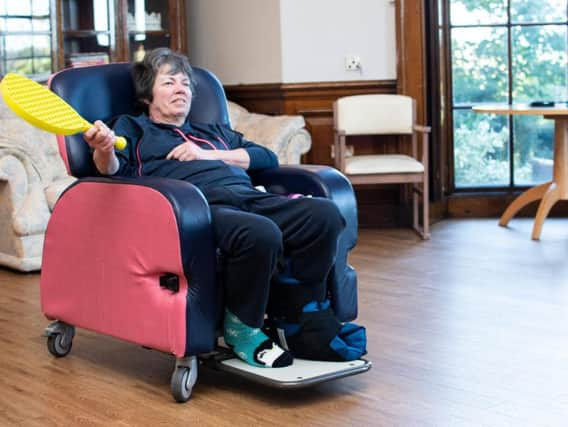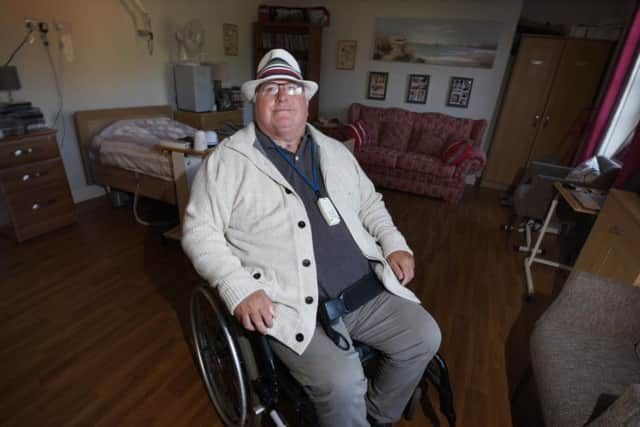Sponsor a Star: Why patients with neurological conditions need specialist care to get the best out of life


It comes after a Sue Ryder investigation into care for people with neurological conditions in England revealed that in Lancashire 307 were inappropriately placed in nursing and care homes in 2018.
According to the report people with conditions such as motor neurone disease, multiple sclerosis, Huntington’s disease and acquired brain injuries are being placed in generalist older people’s nursing homes which may lack the specialist expertise needed to address the needs of individuals with neurological conditions.
Advertisement
Hide AdAdvertisement
Hide AdNicola Hopkins, now a resident at Sue Ryder Neurological Care Centre at Cuerden Hall in Bamber Bridge, was one such woman who had initially been placed into a care home for older people.


At 54, she was at least a decade younger than other residents and her brother Andrew Pinches says her mental health took a downward turn during the six months she spent there.
She had moved into the nursing home in 2018, after accepting that she was struggling to live independently with multiple sclerosis. Recalling the nursing home, Nicola said: “That was for old biddies. They were all old in there. They didn’t know about MS for a younger person.
“I’m definitely happier here. If I want physio all I’ve got to do is ask for it.”
Advertisement
Hide AdAdvertisement
Hide AdOf the 307 people in Lancashire with neurological conditions placed in older people’s care or nursing homes, 157 people were aged under the age of 65.
The report by Sue Ryder also says that for many younger people with neurological conditions, being placed in nursing homes is “socially inappropriate” and is calling for a national plan for better direction and co-ordination for neurological health and care services.
Published in March 2019, it shows that across England 15,143 people with complex neurological conditions were placed in care homes by clinical commissioning groups (CCGs), many of which were also out of the way for families and friends to visit - contributing to social isolation for patients.
Andrew said: “Nicola was getting in a really bad way at the old people’s home. She had just split up with her partner as well. The staff there were perfectly fine but they had limited knowledge of how to deal with her condition.
Advertisement
Hide AdAdvertisement
Hide Ad“She was at least a decade younger than most of the people there. We managed to find Cuerden Hall and we were lucky enough to get a transfer for her. She used to get down a lot but at Sue Ryder she’s improved tremendously.
“What has improved is her mental health - it’s started to pick up at Cuerden Hall. I think it’s a specialised place. They really know what they’re doing. They’re also well-trained for dealing with people with neurological problems.
“I went up with her on the morning she was moving in. She was a little bit uncertain. Then I went to see her a week later and already I could see the difference in her. It was incredible. She wasn’t eating in the other place, she wasn’t taking her medication. Every time I visit I see an improvement.
“She’s getting the right physio at Sue Ryder which she wasn’t getting in the other care home. The staff make sure she gets up every day. She’s got a new wheelchair so she’s been shopping. They do the best they can for Nicola. They have activities in the morning and afternoon.
Advertisement
Hide AdAdvertisement
Hide Ad“I think its seems to me that there’s somebody talking to her about the situation that Nicola finds herself in.
“She says she looks forward to things that she can do rather than look back. Her speech is lots better and she’s a lot more coherent when she’s speaking and she’s swallowing her food better. That’s really positive to see the difference in her complexion and her eyes. She’s only been at Cuerden Hall since April.”
Danny Gallagher had a similar experience after suffered a catastrophic brain injury when he fell and hit his head at work.
He spent two days in a coma following the accident and when he woke up he was paralysed and unable to speak.
Advertisement
Hide AdAdvertisement
Hide AdThe former Preston councillor and Liberal Democrat leader was moved into a nursing home after his time in hospital, but his daughters say the home didn’t have the right rehabilitation facilities that Danny needed, so he didn’t make much progress.
Daniella and Gemma said: “Dad then spent 15 months in hospital, but wasn’t making any progress with his rehab.
“He is quite a private man and being on a large and noisy ward made him uncomfortable. From the hospital, he was moved to a nursing home, but they didn’t have the right rehabilitation facilities that Dad needed, so he still didn’t make much progress in that area.”
Daniella and Gemma managed to transfer Danny to Cuerden Hall where Danny has since thrived.
Advertisement
Hide AdAdvertisement
Hide AdThey said: “Every time we see Dad now he is able to do something new, speak more clearly, able to move in a way he wasn’t before.
“When he first came here the movement on his right side was very limited and one of the biggest things they’ve done here is to help him to remember half of his body.
“Dad is 100 per cent happier living here than where he was before. It is everything that we had hoped for and more. It’s just so nice to know that he is now living somewhere residential where he feels that he has a future.”
The Lancashire Post is campaigning to help raise £1m to add sparkle to the lives of people with degenerative neurological conditions.
Advertisement
Hide AdAdvertisement
Hide AdCharity Sue Ryder is opening a state-of-the-art specialist neurological care centre in Fulwood, Preston, in March - and we are asking our readers to help raise cash to kit out the centre with things which will help patients live fuller lives.
People living with illnesses such as Huntington’s, Multiple Sclerosis, Parkinson’s or Motor Neurone disease can lose access to hobbies and interests because of their illnesses, which in turn affects their health and mental wellbeing.
Our Sponsor a Star fund aims to collect cash to buy items such as an anti-gravity treadmill, which could allow someone with limited mobility to experience a form of running again using a hoist, or a bespoke virtual reality headset - which can realistically simulate a 3D underwater scene for someone unable to take part in scuba-diving in real life.
Readers are welcome to donate any amount to the appeal. Anyone who donates £10 or above will have their names included in our Sponsor a Star spread in the paper, just before Christmas.
To donate, go to www.sueryder.org/makeadonation
Or send a cheque to: Lancashire Post Appeal, Supporter Care, Sue Ryder, 183 Eversholt Street, London, NW1 1BU.